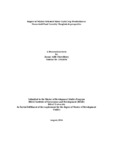Impact of market oriented maize cash crop production on house-hold food security: Bangladesh perspective

View/
Date
2016-08Publisher
BRAC UniversityAuthor
Chowdhury, Jannat AdibMetadata
Show full item recordAbstract
Farming households from some parts of Bangladesh have increasingly been taking up maize production through efforts of a development project called Katalyst as there is huge demand in the national market for maize grains to be used for poultry feed. Maize primarily is used as a cash crop since Bangladeshi households are not habituated with maize consumption. The issue of Household Food Security at the level of farmers mainly depend on their own subsistence production. Therefore, it is very important to understand whether by switching into maize from subsistence crop production system, farmers are being worse-off in terms of their household level food security.
Maize productions have been found to be positively interlinked with economic advance-ment of farmers, notwithstanding it depends on variety of factors. It is interesting to look at the findings accrued from an independent study commissioned by Katalyst which made conclusion on the economic impact of maize cultivation. Drawn from the large n farmers’ survey and verified with the in-depth small n farmer interviews, farmers have reported to make more income through maize production as opposed to their previous crop during the same season.
Evidence shows that the economic gains of farmers through maize production have led to increased level of household food security primarily in relation to nutritional balance. For example, 80% of the survey respondents mentioned that their food habit improvised with the additional earnings from maize production. Farming households have reported a rise in affordability consume protein based foods such as fish or meat on an weekly basis with the additional income generated from maize production.
Evidence shows that there lies a positive relationship between increased maize production and household food security. Farmers have positive perception about maize cultivation and they feel that by increasing maize production they have been able to reduce their dependency on rice crop.
